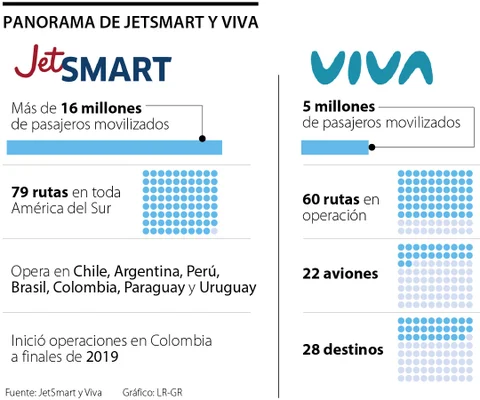JetSmart expressed its desire to acquire 100% of Viva’s shares on 7 February. Estuardo Ortíz, CEO of the airline that seeks to expand its operations in South America, assured that, if the negotiation were to take place, there would be no monopoly, as they do not share domestic routes, but 3% at the international level with the Lima-Cuzco route.
In this regard, Latam made its first statement on the case. The company’s legal representative sent a letter to Edgar Benjamín Rivera, director of Air Transport and Aerocommercial Affairs of the Special Administrative Unit of Civil Aeronautics, with a copy to the Superintendence of Industry and Commerce, requesting that 100% of Viva’s slots be returned to El Dorado Airport if the transaction is authorise.
Latam and Wingo comment on the integration process between Viva and Avianca
„Any valuation must be verified so that these slots are assigned and distributed by the Aerocivil to air transport operators other than Avianca”. Furthermore, the letter adds that their distribution should be under non-discriminatory and transparent conditions.
The letter protests the filing of the integration process between the two airlines, because it was done confidentially, which prevented companies such as Latam from being able to make a proper statement and mitigate the negative impacts of this operation.
Latam and Wingo comment on the integration process between Viva and Avianca
On this, Wingo assures that it is waiting in the wings. „An eventual integration of these two airlines would represent the configuration of an actor with up to 65% of the slots in the slots of greatest demand in the operation of El Dorado Airport in Bogota,” said Wingo.
In addition, it says that it is necessary to ensure the direct participation of all interested third parties to ensure greater transparency and a more technical and democratic analysis from the Directorate of Air Transport and Aerocommercial Affairs. Likewise, the company assures that the figure of 'positive administrative silence’, which enables this new procedure, should not be an alternative.
As a final consideration, it expresses that „neither in this, nor in any other industry, is it appropriate to concentrate the market under the argument of saving a company in crisis. All airlines have faced an environment of high inflation, devaluation of our currencies and a considerable increase in fuel costs.
He concludes that „the low-cost model in Colombia is more alive than ever” and that its continuity does not depend on the existence of a single operator.María Camila Gil Niebles




